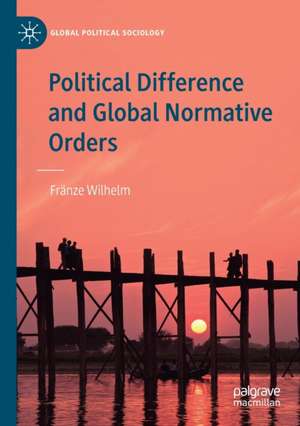Political Difference and Global Normative Orders: Global Political Sociology
Autor Fränze Wilhelmen Limba Engleză Paperback – 11 iun 2022
statehood and homogeneous social communities within national borders, global
order has become a question of alternative political articulations, resistance
movements, and cultural diversity, among others. This book first critically
analyzes the conditions for the struggles of theorizing global normative order in
political and IR theory. Second, to make sense of the presence of difference and
possibility for global normative order in view of the simultaneous absence of first
foundations, the study draws on post-foundational thinking based on the seminal
work of German philosopher Martin Heidegger and Argentine political theorist
Ernesto Laclau. Finally, the author develops a theoretical framework for a
hauntological approach to global normative order that provides an alternative
and theoretically coherent explanation for the emergence of global order. This is
of interest to scholars as well as practitioners (including activists) concerned with
global social relations, global political discourse, and the construction of global
identity and normative order(s).
| Toate formatele și edițiile | Preț | Express |
|---|---|---|
| Paperback (1) | 887.05 lei 6-8 săpt. | |
| Springer International Publishing – 11 iun 2022 | 887.05 lei 6-8 săpt. | |
| Hardback (1) | 892.28 lei 6-8 săpt. | |
| Springer International Publishing – 10 iun 2021 | 892.28 lei 6-8 săpt. |
Preț: 887.05 lei
Preț vechi: 1081.77 lei
-18% Nou
Puncte Express: 1331
Preț estimativ în valută:
169.76€ • 176.58$ • 140.15£
169.76€ • 176.58$ • 140.15£
Carte tipărită la comandă
Livrare economică 15-29 aprilie
Preluare comenzi: 021 569.72.76
Specificații
ISBN-13: 9783030740719
ISBN-10: 3030740714
Pagini: 265
Ilustrații: VIII, 265 p. 1 illus.
Dimensiuni: 148 x 210 x 20 mm
Greutate: 0.33 kg
Ediția:1st ed. 2021
Editura: Springer International Publishing
Colecția Palgrave Macmillan
Seria Global Political Sociology
Locul publicării:Cham, Switzerland
ISBN-10: 3030740714
Pagini: 265
Ilustrații: VIII, 265 p. 1 illus.
Dimensiuni: 148 x 210 x 20 mm
Greutate: 0.33 kg
Ediția:1st ed. 2021
Editura: Springer International Publishing
Colecția Palgrave Macmillan
Seria Global Political Sociology
Locul publicării:Cham, Switzerland
Cuprins
Chapter 1: Introduction.- Chapter 2: Order: From Social Cohesion To Global Disorder.- Chapter 3: Difference: Metaphysics Of The Social.- Chapter 4: Hauntology Of Global Normative Order(S).- Chapter 5: Conclusion: The (Im)Possibility Of Global Normative Order(S).
Notă biografică
Fränze Wilhelm is a researcher at the Kiel University Research Group on International Political Sociology.
Textul de pe ultima copertă
"Fränze Wilhelm’s book is one of the rare studies in International Relations (IR) employing post-foundational theories to grasp the prospect of a global normative order. The combination of philosophical vocabulary with IR literatures is brilliant, making this book a must-read for students and scholars in various fields of the social sciences and humanities. While it does not develop the contours of a positive global normative order, it certainly succeeds in unveiling the complexities of globally articulated relations of difference. Only a handful of books in IR show a similar degree of innovation and rigorousness!"
--Prof. Dr. Dirk Nabers, University of Kiel (Germany)
"'Political Difference and Global Normative Orders' provides an excellent discussion of the current scholarship on the question of order and difference. The author, by resorting to the post-foundational approach of hauntology, makes a valuable contribution to the study of order in IR and beyond."
--Dr.David Shim, University of Groningen (The Netherlands) Once considered a question of an international order based on consolidated statehood and homogeneous social communities within national borders, global order has become a question of alternative political articulations, resistance movements, and cultural diversity, among others. This book first analyzes critically the conditions for the struggles of theorizing global normative order in political and IR theory. Second, to make sense of the presence of difference and possibility for global normative order in view of the simultaneous absence of first foundations, the study draws on post-foundational thinking based on the seminal work of German philosopher Martin Heidegger and Argentine political theorist Ernesto Laclau. Finally, the author develops a theoretical framework for a hauntological approach to global normative order that provides an alternative and theoretically coherent explanation for the emergence of global order. This is of interest to scholars as well as practitioners (including activists) concerned with global social relations, global political discourse, and the construction of global identity and normative order(s).
Fränze Wilhelm is a doctoral candidate at the Kiel University Research Group on International Political Sociology.
"'Political Difference and Global Normative Orders' provides an excellent discussion of the current scholarship on the question of order and difference. The author, by resorting to the post-foundational approach of hauntology, makes a valuable contribution to the study of order in IR and beyond."
--Dr.David Shim, University of Groningen (The Netherlands) Once considered a question of an international order based on consolidated statehood and homogeneous social communities within national borders, global order has become a question of alternative political articulations, resistance movements, and cultural diversity, among others. This book first analyzes critically the conditions for the struggles of theorizing global normative order in political and IR theory. Second, to make sense of the presence of difference and possibility for global normative order in view of the simultaneous absence of first foundations, the study draws on post-foundational thinking based on the seminal work of German philosopher Martin Heidegger and Argentine political theorist Ernesto Laclau. Finally, the author develops a theoretical framework for a hauntological approach to global normative order that provides an alternative and theoretically coherent explanation for the emergence of global order. This is of interest to scholars as well as practitioners (including activists) concerned with global social relations, global political discourse, and the construction of global identity and normative order(s).
Fränze Wilhelm is a doctoral candidate at the Kiel University Research Group on International Political Sociology.
Caracteristici
Analyzes the conditions for the struggles of theorizing global normative order in political and IR theory Develops a theoretical framework for a hauntological approach Draws on post-foundational thinking based on the seminal work










